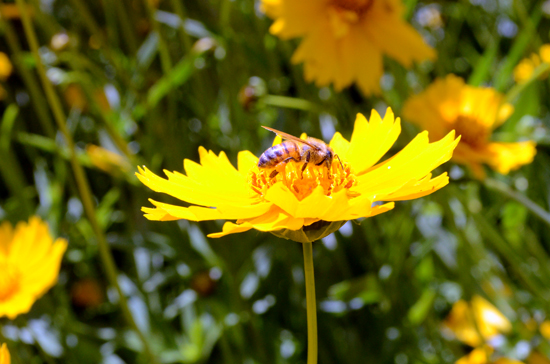UK research focusing on bringing back pollinators
UK research focusing on bringing back pollinators

Golf courses may provide a haven to rebuild dwindling pollinator populations which in turn could boost ecosystem health and benefit everyone, said researchers in the University of Kentucky College of Agriculture .
In a project called Operation Pollinator, Emily Dobbs, a graduate student in entomology, and her adviser, UK entomology Professor Dan Potter, are working with five Lexington golf courses to attract pollinators and monarch butterflies by establishing areas of native wildflowers.
“The goal is for the wildflowers to provide a diverse group of pollinators with a food source and refuge and for the wildflower mixture be a sustainable choice for turf managers in Kentucky,” Dobbs said.
In the past five to 10 years, researchers estimate that pollinator populations have declined anywhere from 30 to 60 percent, depending on the pollinator. Potter believes habitat loss and fragmentation caused by urban development are the main culprits.
“By augmenting pollinator habitat with sites like these, we can help to conserve their benefits for gardens and the like,” Potter said. “In the case of monarchs, these areas will provide stepping stones for them, or weigh stations, as they migrate from North America to Mexico each winter.”
One wildflower mixture targets monarch butterflies. Two other mixtures were designed to attract bees native to Kentucky, which includes small, solitary bees like halictids and andrenids and large, social bees like bumble bees.
Dobbs received help developing the mixtures from Sharon Bale, UK extension floriculturist, and Diane Wilson of Applewood Seed Company in Arvada, Colo. All flowers used in the mixtures are native to Kentucky and are either perennials or self-seeding annuals. They designed the mixtures for season-long bloom, which aids in aesthetics in addition to providing the ideal pollinator habitat. Thus far, some of the top performing species have been lanceleaf coreopsis, plains coreopsis and bergamot.
The Swiss-based company Syngenta started Operation Pollinator in Europe more than a decade ago. Dobbs’ research project is the first one for golf courses in North America.
“We’ve tried to be leaders in conservation biology for landscapes and golf courses for many years,” Potter said, noting the UK Department of Entomology’s work with biological control and beneficial insect preservation.
The first year of data collecting for the three-year project was in 2012. During the growing season, roughly from June through October, Dobbs and Samantha Marksbury, a recent UK graduate in entomology and animal sciences, collect pollinators from the flowers in the plots throughout the summer and fall using a variety of methods.
Research plots are located on five Lexington golf courses and on UK’s Spindletop Research Farm. Each plot is 10 meters wide by 40 meters long (or about 32 ft. by 131 ft.).
The goal is for the plots to be an option for golf course managers instead of the traditional or naturalized roughs, but they could also use them around tee boxes and greens, Dobbs said.
Once researchers have the best mixture for pollinator populations, it will be released to the public. Dobbs and Potter said in addition to golf courses, the mixture could work on horse farms, parks and personal property.
While researchers developed the wildflower mixtures specifically for Central Kentucky, they may also perform well in states in the turf industry’s transitional zone, which includes Kentucky and at least sections of neighboring states.
Dobbs said golf course superintendents were receptive to the project, and in the coming years, Marriott plans to establish the mixture on 11 of their golf courses across the United States.
Entomology Extension Horticulture Research

